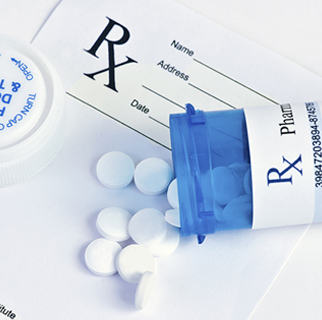Health Library
Stay on top of your health and access your source of healthcare updates, wellness tips, and insightful information that will empower you to feel better.
Prescription Drug Addiction
People take prescription medicines for many reasons. They may use them to ease pain, anxiety, or attention deficit disorder. Most of these people use such possibly addictive medicines correctly. But some people end up abusing them.
Prescription medicine abuse or misuse is when the medicine is used in a way other than its intended use as prescribed by a healthcare provider. The goal of using the medicine becomes about the experience or feeling that it causes.
In some cases, people may abuse medicines that aren’t prescribed to them. They may get them from friends or family. Or they may buy them illegally from someone else. The number of teens and young adults ages 12 to 25 who abuse prescription painkillers has more than tripled since the mid-1990s.
Here is a Q and A about prescription medicine addiction. It can help you or a loved one seek help, if needed.
Q. What medicines are likely to be abused?
A. These 3 kinds of prescription medicines are most often abused without a prescription:
Opioids. These are for pain relief. They include morphine, codeine, and medicines that contain hydrocodone, oxycodone, and fentanyl.
Tranquilizers. These are for anxiety and sleep disorders. A few examples are alprazolam and diazepam.
Stimulants. These are for narcolepsy and attention-deficit/hyperactivity disorder. Examples are amphetamine, dextroamphetamine, and methylphenidate.
Q. What are the symptoms of prescription addiction?
A. Signs of addiction include:
Loss of control over taking a medicine
Hiding pills
Obsessively counting pills
Finding ways to get more of a medicine by making unneeded visits to the emergency room or a healthcare provider's office
Taking a medicine more often than directed
Taking higher doses than directed because the previous dose did not provide the same effect
Taking a medicine with other medicines or alcohol
Crushing and snorting a pill instead of swallowing it
Stealing prescription medicines from family or friends
Risking employment, finances, and personal relationships in order to use or get pills
Q. Who’s at risk for prescription addiction?
A. Both women and men are at risk for prescription addiction. People at the highest risk for addiction are those who have other addictions or who have abused prescription medicines in the past. Young people are also at risk. According to research done in 2019 by the CDC, about 7% reported the current use of prescription opioids.
Q. What steps can be taken to prevent addiction?
A. Steps to take include:
Take medicines only as prescribed.
Get possibly addictive medicines only from a single licensed healthcare provider at one pharmacy. Most states have electronic databases that keep track of controlled substances. Providers and pharmacies can see any prescription written and filled for you regardless of where you got it or filled it.
If you have opioids, tranquilizers, or stimulant prescription medicines, keep them in a safe place. Don't keep medicines in an easy-access area, such as a kitchen or bathroom cabinet. Lock them up to keep them secure.
Don’t share them with anyone else. The prescription is for only you.
Keep track of the number of pills left in the bottle so you will know if any go missing.
If teenagers live in your home, educate them about the appropriate use of prescription medicines and the dangers of misuse.
If you no longer need a prescription, dispose of the pills correctly. Many local law enforcement agencies will help with this. Many communities participate in National Take Back Day on October 27 of each year. The goal of this event is to reduce the amount of unused and possibly addictive medicines in the community.
Online Sources
- National Institute on Drug Abuse
- National Institute on Drug Abuse
- National Institute on Drug Abuse
- National Institute on Drug Abuse
- Monitoring the Future (Institute for Social Research, University of Michigan)
- Substance Abuse and Mental Health services administration
- Although relatively Few DOctor Shoppers Skew Opiod Prescribing, National Institute on Drug Abuse
- Understanding Drug Use and Addiction, National Institute on Drug Abuse
Meet our Doctors


Friday, 09:00 AM - 12:00 PM
See More

Friday, 01:00 PM - 05:00 PM
See More

See More
See More
Related Services
10% KOH
10% KOH SMEAR
17 OHP (17 HYDROXYPROGESTERONE)
Topics
- Adolescent Medicine
- Alcohol and Drugs
- Allergy
- Asthma
- Bariatrics
- Bone Cancer
- Brain Cancer
- Breast Cancer
- Breast Health
- Burns
- Cardiac Electrophysiology
- Cardiology
- Cardiothoracic Surgery
- Colorectal Cancer
- Colorectal Conditions
- Complementary Medicine
- Craniofacial
- Dermatology
- Diabetes
- Emergency Medicine
- Endocrinology
- Environmental Medicine
- Gastroenterology
- Genetics
- Geriatrics
- GI Cancer
- Glossary
- Gyn Oncology
- Gynecology
- Hand Surgery
- Hematology
- Hepatology
- Home Health
- Hospice
- Immunology
- Infectious Disease
- Interventional Cardiology
- Journey Stage
- Lab Tests
- Lactation
- Lung Cancer
- Men's Health
- Mental Health
- Navigating Healthcare
- Neonatology
- Nephrology
- Neurology
- Neurosurgery
- Nuclear Medicine
- Nutrition
- Obstetrics
- Oncology
- Ophthalmology
- Oral Health
- Orthopaedics
- Otolaryngology
- Pain Management
- Pathology
- Pediatrics
- Perinatology
- Physical Medicine and Rehabilitation
- Plastic Surgery
- Prostate Cancer
- Prostate Health
- Psychiatry and Behavioral Health
- Pulmonary
- Radiology
- Rehabilitation
- Reproductive Medicine
- Rheumatology
- Safety
- Skin Cancer
- Sleep Disorders
- Spine
- Sports Medicine
- Stroke
- Surgery
- Terminal Illness
- Therapeutic Radiology
- Transplantation
- Travel Medicine
- Urologic Cancer
- Urology
- Vascular
- Wellness
- Women's Health
- Wound Care












